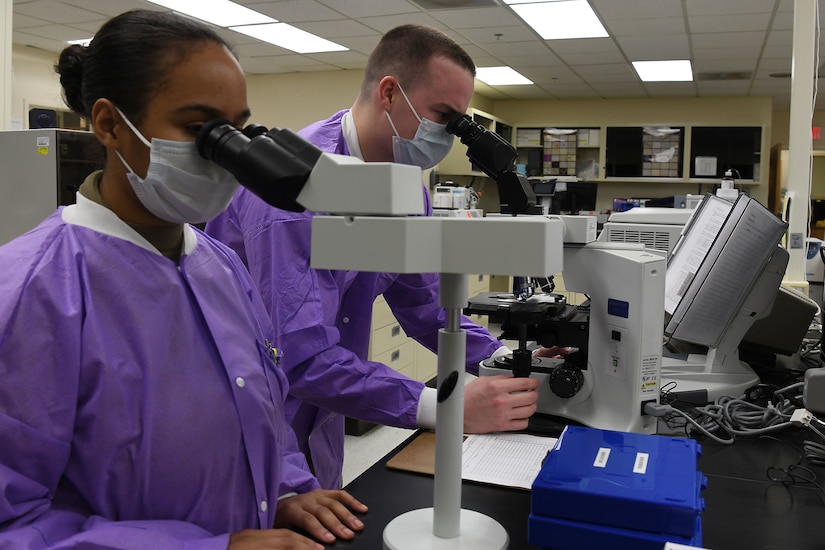April 27, 2020 | BY Air Force Staff Sgt. Brittany Murphy
Medical Laboratory Professionals Week, also known as Lab
Week, is observed annually to promote awareness and show appreciation to
medical laboratory professionals and pathologists for the work they do.
This year, however, Lab Week is taking place under different
circumstances. Due to the outbreak of COVID-19, medical laboratory staffs are
having to adapt to keep patients safe during a worldwide pandemic.
To show their support, members of Vandenberg Air Force Base,
California, made this year's Lab Week theme "The Silent Warriors behind
COVID."
While safety procedures such as wearing face masks have been
put in place across the installation, the operations at the 30th HCOS
laboratory have not changed. Patients are still greeted by lab technicians, who
are able to safely obtain samples and perform the critical tests needed to
ensure patients are receiving the care they need, despite the challenges
imposed by COVID-19.
The job of a laboratory technician is not as easy as simply
drawing blood. Lab techs, and the information they provide, are extremely
important to mission readiness. Once they draw blood, they perform tests that
aid in various diagnoses. Their continuous support directly aids the 30th Space
Wing's individual medical readiness, flight physicals and occupational health
readiness.
As members at the 30th HCOS continue to provide care during
the pandemic, they are focused on finding better and timelier ways to assist
their patients.
In addition to the daily diagnostic activities, lab techs
are at the forefront of implementing new diagnostics and therapies for better
patient care.
Air Force Capt. Lenita Campbell, the officer in charge of
diagnostics and therapeutics, said Vandenberg was the first base in the Space
Force and the second outpatient clinic in the Defense Department to provide
COVID-19 testing. In addition to standard testing, the COVID-19 rapid testing
capability was brought to the 30th Medical Group about a week before the start
of Lab Week.
"BioFire technology is a game changer," said Air
Force Lt. Col. Joseph Rountree, the 30th HCOS commander. "Before BioFire,
all tests were shipped to one of our DOD reference labs in San Diego, which had
a 24- to 72-hour turnaround time. Bringing this new technology to the 30th
Medical Group allows us to get results within an hour, which will support
operational and health care decisions."
Because supplies are limited, BioFire will be used on a
case-by-case basis. If patients meet the criteria for testing, two types of
tests can be administered. A mission impact assessment made by affected
commanders and the base public health officer will determine if the affected
member's test will be done in-house or sent to a military reference laboratory.
"The laboratory team was very excited to bring this
technology to Vandenberg because this will allow our health care providers to
collect from symptomatic patients and have results within an hour,"
Campbell said. "This will allow for quicker diagnosis of the disease,
which will ultimately protect our military mission and community by issuing
proper isolation and quarantine protocols to anyone exposed. Additionally, a
faster result time has the potential to reduce the number of people placed in
quarantine which keeps our members launching rockets, one lab test at a
time."
(Air Force Staff Sgt. Brittany Murphy is assigned to the
30th Space Wing.)









